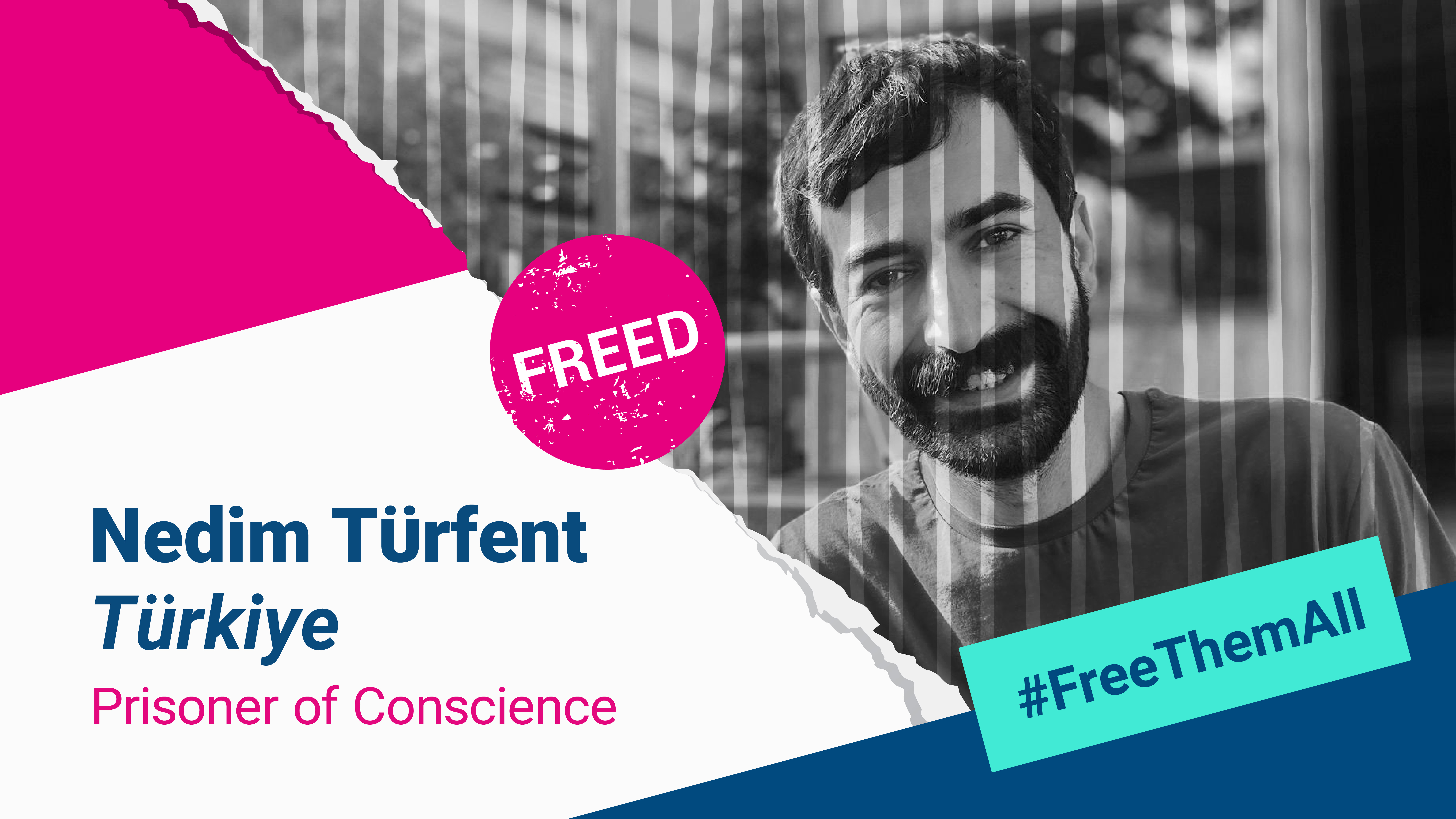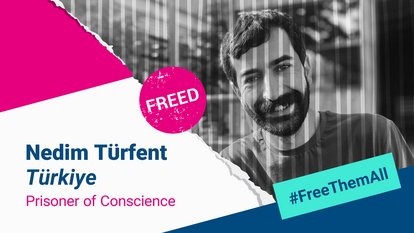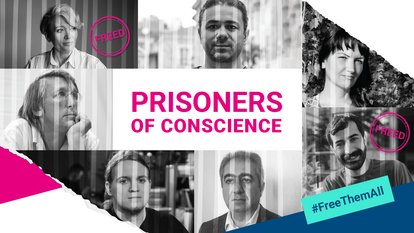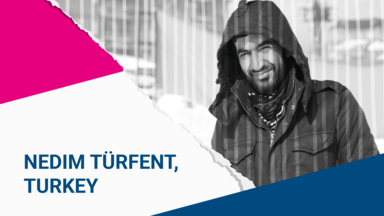Human Rights
Interview with Freed Prisoner of Conscience: Nedim Türfent

Kurdish journalist, poet, and writer Nedim Türfent spent more than six years in a Turkish jail for “membership in a terrorist organisation” after being arrested in 2016. Many international media and human rights organisations protested against his detention and verdict, saying that he was sentenced on trumped up charges for his work as a journalist. In November 2022 Türfent was released from jail and almost right away resumed his work as a journalist.
Q: How did you decide to start working as a journalist?
Kurds in Turkey have been struggling for their rights and freedoms for over a century. During this long period, Kurds have been subjected to intense oppression, from assimilation policies to unsolved murders. Journalists who publicized these oppressions have always been targeted by the Turkish state. In 2012, when I started working as a reporter, there were many imprisoned Kurdish journalists and there was a severe need for more who could report the problems and persecution of Kurds. I wanted to voice the human rights violations of the people as much as I could.
Q: Tell us a bit more about your work as a journalist and the publication you worked for.
I have always practiced human rights-oriented journalism throughout my career. In 2012, I joined the team of the Diyarbakır-based Dicle News Agency, which covers topics related to the Kurdish community. I worked at the agency both as an English news editor and as a reporter. For years, dozens of Kurdish journalists have either been killed or imprisoned. They have become targets due to their reports Kurdish rights and freedoms or the state's oppression and persecution. I have many friends who are still in prison.
That period coincided with a period of renewed clashes between Kurdish guerrillas and Turkish security forces, especially in the spring of 2015. A prolonged state of war began as months-long curfews were imposed in city centres and neighbourhoods were destroyed by combat and bombardment. In August 2015, Turkish special operations police carried out a dawn raid on a construction site in my hometown of Yüksekova. They forced from 35 to 40 Kurdish workers to the ground, half-naked and face down. They handcuffed them behind their backs, then tortured and insulted them. When I published the footage of this incident, it shocked the public. Investigations were launched against the police officers. I was subjected to systematic pressure by the police until eventually I was arrested. First, they harassed me and "warned" me to quit journalism. Then they attacked me with rubber bullets and gas bombs. I continued to report on rights violations. I won an award for my coverage of this topic, however in January 2016, the police threatened to kill me. I reported on countless rights violations involving the state's law enforcement agencies and turned into a persona non grata.
Q: You were detained in 2016 and charged with “membership in a terrorist organisation” and “making terrorist propaganda”. What led to those charges?
The state was very disturbed by my reporting on rights violations because they wanted to carry out their military operations in the city as they pleased. They bombed neighborhoods and burned down hundreds of houses. They also wanted to make my murder join the pile of “unsolved cases”. On May 12, 2016, they stopped me while I was driving and made me lie on the ground while they tortured and beat me. They blindfolded me and handcuffed my hands behind my back. In the afternoon of the same day, they took me to a hill. They fired a shot in the air and debated whether to kill me or not. Finally they took me to a police station. Initially, the police denied my detainment. Then they accused me of reporting about their operations but I explained that I was a journalist with the legal right to do so. They did not allow me to physically attend any of their hearings. I made my defence via video conference from a prison cell. Moreover, my defence, delivered in Kurdish, my native language, was not properly translated into Turkish. The prosecution brought 21 witnesses. However, all the witnesses retracted their statements against me. They said that the police forced them to sign some papers under duress. One of the female witnesses told the judge: "The police told me 'if you don't sign the paper, we will rape you'. The statements on the paper are not mine."
The prosecution did not present a single piece of concrete evidence. There were many violations of rights in this trial but, despite all this, I was given a long sentence.
Q: You were sentenced to eight years and nine months in prison. Did you expect that sentence?
I was sentenced to eight years and nine months in prison without a single piece of evidence. With its sentence, the court committee actually admitted: "Nedim Türfent was punished for reporting disturbing news." We appealed the verdict to higher courts. In the new judicial package enacted in 2019, the phrase "expressions for news purposes do not constitute an element of crime even if they are disturbing and shocking" was added to the law. Despite this, our appeals were rejected. We applied to the European Court of Human Rights, ECHR, but even though I finished my sentence and was released on November 29, 2022, the ECHR has still not given us an answer.
I was expecting a sentence, because it was as if the state had sworn to punish me for my coverage on their frivolities. The court's approach was very political; if it had been an independent court, it would have tried the police officers who tortured me instead. I was expecting a sentence, but since they didn't have the slightest evidence, I thought the worst they could give me was three years for propaganda. However, shockingly I was given a heavy sentence for "membership in an armed terrorist organisation". Apparently, my pen was my weapon. I still have it.
Q: You spent more than six years behind bars. Tell us about your stay in prison.
I had to stay a total of 6 years and 7 months behind bars. In the first years in prison, I was reporting on the rights violations that took place in my jail, so they started to send me to another prison every few months. Because I continued reporting, the prison authorities put me in an isolation cell for 19 months. Overall, I was imprisoned during the period when rights violations in Turkish prisons increased the most. All of the prisoners’ social rights were taken away during the state of emergency (2016-2018) and during the Covid-19 pandemic.
"They blindfolded me and handcuffed my hands behind my back. In the afternoon of the same day, they took me to a hill. They fired a shot in the air and debated whether to kill me or not."
Q: What gave you strength during your imprisonment?
It was hope. It was that unique support and solidarity that transcends borders and walls. It was my belief in journalism and that I was right. It was my passion for the resilient tradition of the free press. It was the hundreds of books I read. And of course, it was poetry.
The campaign led by international rights and journalism organisations was very important and a valuable source of support. That support and solidarity may not have brought me freedom, but it did improve my state of living. It allowed me to breathe in that narrow and gloomy cell. I would like to emphasize that every line, every letter written to people arrested for their thoughts or writings is precious. Please keep this in mind.
Q: You were released from prison at the end of 2022. What was the first thing you did?
November 29, 2022. When I woke up that day, I was feeling entirely different. I had completed the time I was legally required to spend in prison and had reached the day of "freedom." The thought of "what if the state does something and I can't get out" kept nagging at the back of my mind. Finally, the guard told me to get ready, took my bags of letters and walked to the prison yard. After so many years, the sky seemed so big! I looked towards the horizon and my eyes were dazzled. For years, my gaze had always been stuck on walls. I went to the side of the road and took the soil in my hand, touched it, and then touched a tree.
Q: Turkey is considered one of the worst places in the world to be a journalist. Your publication got shut down shortly after your detention. Will you continue working as a reporter?
I resumed journalism only three months after I was released from prison. I have been working as an editor and reporter for the Istanbul-based Bianet, a rights-oriented media outlet, since March. My pen is now like a part of my body. It is out of the question for me to leave it.
Q: What would you tell young people in Turkey who dream about becoming journalists?
My humble advice to young people would be: Pick a side. Pick the side of the people, the side of the public interest. Be the voice of the people whose rights are violated, who are persecuted and oppressed. Whoever the sovereign powers would like to silence - you give them a microphone. When the time and place come, when everyone ignores violations under oppressive governments, you never let go of your pen. Even if many people prefer to keep their heads down because of fear, you do not spare the light of your camera. Unfortunately, the state of the journalism profession in our country is not good and its future is not bright. Only journalists who stick to the truth can keep this profession alive. Be the light so that darkness does not prevail. Remember that even a single match can overcome the deepest darkness. Choose to be the light that tears the darkness. Never underestimate the power of your pen and of your words. Words are mighty.
Q: What is the message that you, the poet Nedim Türfent, wants to share with the world?
If I were to give a message within the context of our topic, there are many poets and writers behind bars all over the world, from Eritrea to China, from Iran to Belarus. Let us keep them all in our minds and hearts, regardless of the colour of their language. From wars to ecological destruction, our world is not heading in the right direction. We humans are causing it. Let us not forget our poets, writers, and journalists who make bad situations visible and use words to give colour to life. If we build bridges between peoples through literature, we can overcome the senseless and unnecessary politics of destruction and make the world a peaceful and free place to live in. Do not lose faith in dialogue and words.


Prisoners of Conscience from East and Southeast Europe
We feature select few prisoners of conscience out of the many in East and Southeast Europe. One political prisoner is one too many.
Find out who the other political prisoners are #PrisonersofConscience #FreeThemAll and in the special Focus on our website.
Find the first feature of Nedim's story below.
Prisoner of Conscience: Nedim Türfent

Find out the story of the prisoner of conscience from Turkey. “Because authoritarianism in Turkey has yet to peak, it is now more crucial that writers fulfil their responsibility to promote peace and freedom in our everyday lives,” said the imprisoned Turkish journalist, writer, and poet Nedim Türfent.